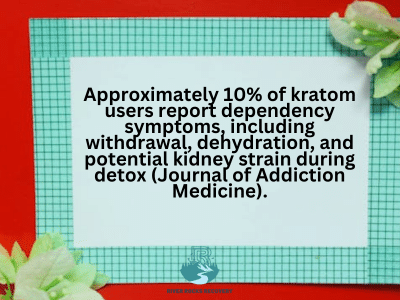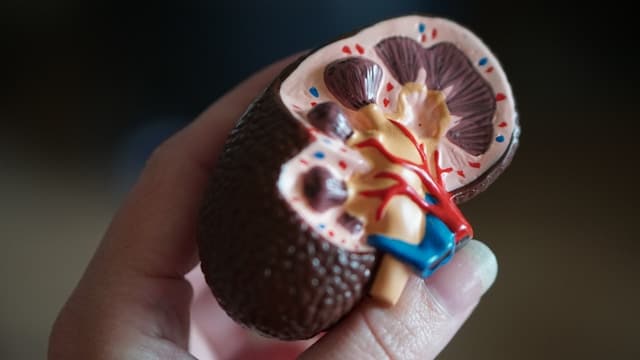Kratom, a plant native to Southeast Asia, has gained popularity in recent years as a natural remedy for pain relief, energy enhancement, and managing opioid withdrawal symptoms. While it’s often marketed as a safer alternative to prescription drugs, kratom can have significant side effects, particularly when it comes to kidney health. Understanding the potential impact of kratom on your kidneys is crucial for making informed decisions about its use and seeking help if dependency or adverse effects develop.
What is Kratom and How Does It Work?
Kratom (Mitragyna speciosa) is derived from the leaves of a tropical tree native to Southeast Asia. It contains compounds like mitragynine and 7-hydroxymitragynine, which interact with opioid receptors in the brain, producing effects similar to opioids.
Uses of Kratom
- Pain Relief: Kratom is often used to manage chronic pain.
- Energy Boosting: In low doses, it acts as a stimulant.
- Mood Enhancement: Users report feelings of euphoria and relaxation.
- Opioid Withdrawal Management: Some people use kratom as a substitute for opioids to alleviate withdrawal symptoms.
What Role Does The Kidney Play?
The kidneys are critical in filtering toxins from the body, regulating blood pressure, and balancing electrolytes. Substances like kratom can place added stress on these vital organs. Research into the influence of this plant to kidneys is limited. Still, anecdotal evidence and emerging case studies suggest that long-term use may increase the risk of kidney damage. Symptoms like dehydration, urinary retention, and a build-up of toxins in the bloodstream have been reported in some users. These issues could potentially escalate to chronic kidney disease if kratom is used without medical supervision or in excessive amounts.
Individuals struggling with substance use, including kratom dependency, may find themselves in a cycle that exacerbates health risks. In such cases, seeking support through an Addiction Treatment Program can be the first step toward addressing the root causes of dependence while mitigating potential health complications.
How Does Kratom Affect the Kidneys?
The kidneys play a vital role in filtering waste and toxins from the blood, and kratom’s effects on this organ can vary depending on the frequency and dosage of use. Prolonged or heavy use of kratom has been linked to kidney damage due to several factors:
1. Dehydration
Kratom has diuretic properties, meaning it increases urine production. Prolonged use can lead to:
- Excessive Fluid Loss: Dehydration strains the kidneys, making it harder for them to filter waste effectively.
- Electrolyte Imbalance: Loss of essential minerals can impair kidney function.
2. Oxidative Stress
The compounds in kratom may contribute to oxidative stress in the body.
- Free Radical Damage: Increased oxidative stress can harm kidney cells, leading to reduced function over time.
- Inflammation: Chronic inflammation caused by oxidative stress may exacerbate kidney damage.
3. Increased Toxin Load
Kratom is metabolized in the liver, but its metabolites are excreted through the kidneys.
- Metabolite Accumulation: High doses or frequent use can overwhelm the kidneys, causing strain.
- Toxicity Risks: Long-term use may result in a buildup of toxins that damage kidney tissues.
4. Rhabdomyolysis
Rare but severe, rhabdomyolysis involves the breakdown of muscle tissue, releasing proteins and electrolytes into the bloodstream that can clog the kidneys.
- Kratom Link: Some case reports suggest that high doses of kratom may trigger rhabdomyolysis, leading to acute kidney failure.
5. Interactions with Preexisting Conditions
Individuals with preexisting kidney issues or conditions like high blood pressure or diabetes may be at higher risk.
- Compounded Damage: Kratom use can exacerbate existing kidney problems
The Link Between Kratom Dependency and Kidney Stress
Dependency on kratom often leads to prolonged use, which can strain the kidneys over time. Regular kratom consumption may contribute to dehydration, a condition that reduces the kidneys’ ability to function optimally. Additionally, kratom’s alkaloids, the active compounds responsible for its effects, are metabolized in the liver and excreted through the kidneys. Over time, this process could lead to an accumulation of metabolites, potentially causing nephrotoxicity or other kidney-related problems.
For individuals struggling with kratom dependency, tailored treatment options like a Partial Hospitalization Program or an Intensive Outpatient Program can provide structured care to address substance use while monitoring physical health. These programs often integrate medical supervision, counseling, and education to help patients recover holistically.
Spotting the Warning Signs of Kidney Strain
It’s crucial to be aware of potential warning signs indicating kidney stress or damage from kratom use. Symptoms such as persistent fatigue, swelling in the limbs, reduced urine output, or changes in urine color should not be ignored. Left unchecked, these symptoms can lead to severe complications, including kidney failure. Regular medical check-ups are essential for anyone consuming kratom frequently, as early detection of kidney issues can significantly improve outcomes.
At River Rocks Recovery, our Outpatient Program and Sober Living Program are designed to help individuals regain control of their health and well-being. By combining evidence-based therapies with a supportive environment, we ensure that clients can navigate their recovery journey while addressing any underlying health concerns, including those related to kidney function.
Signs of Kidney Problems from Kratom Use
Recognizing early signs of kidney issues is crucial for preventing long-term damage. Symptoms include:
- Frequent or Reduced Urination: Changes in urination patterns may indicate kidney strain.
- Swelling: Fluid retention can cause swelling in the legs, ankles, or face.
- Fatigue: Impaired kidney function can lead to toxin buildup, causing fatigue.
- Dark Urine: Indicates dehydration or the presence of blood or protein in the urine.
- Back Pain: Pain in the lower back may signal kidney problems.
When to Seek Help for Kratom Dependency
Kratom’s potential for dependency can make it difficult to stop using, even when adverse effects like kidney problems arise. Signs of kratom dependency include:
- Cravings: Persistent desire to use kratom despite negative consequences.
- Withdrawal Symptoms: Irritability, anxiety, muscle aches, or insomnia when attempting to quit.
- Increased Tolerance: Needing higher doses to achieve the same effects.
Protecting Kidney Health During Recovery
In addition to addressing kratom dependency, taking steps to protect kidney health is essential for long-term recovery:
1. Hydration
Drink plenty of water to prevent dehydration and support kidney function.
2. Nutrition
A balanced diet rich in fruits, vegetables, and lean protein provides essential nutrients that support kidney health.
3. Regular Check-Ups
Monitor kidney function through routine blood and urine tests, especially if you’ve experienced symptoms of kidney strain.
4. Avoid High-Dose Supplements
Certain over-the-counter supplements can strain the kidneys, particularly if combined with kratom or other substances.

Promoting Kidney Health Through Recovery
Recovery from kratom dependency involves more than breaking free from its physical hold; it’s about restoring overall health and preventing long-term complications. Strategies such as staying hydrated, following a balanced diet, and avoiding substances that place additional stress on the kidneys are crucial. Equally important is the psychological aspect of recovery, which can be supported through counseling, peer support, and tailored treatment plans.
River Rocks Recovery, an Addiction Treatment Center Ohio, offers a sanctuary of healing for individuals navigating substance use and mental health challenges. Our compassionate team combines evidence-based approaches and holistic therapies to foster resilience and personal growth. Whether you’re entering recovery for the first time or seeking to maintain sobriety, we provide a safe, supportive space to build a strong foundation for comprehensive well-being.
How River Rocks Recovery Can Help
1. Addiction Treatment Program
Our comprehensive program provides medical and psychological support to address kratom dependency and its effects on the body, including the kidneys.
2. Partial Hospitalization Program (PHP)
PHP offers intensive care for those experiencing severe withdrawal symptoms or health complications from kratom use.
3. Intensive Outpatient Program (IOP)
IOP provides flexibility, allowing individuals to receive treatment while maintaining daily responsibilities.
4. Sober Living Program
For those transitioning from inpatient care, our Sober Living Program provides a supportive, substance-free environment.
5. Integrated Mental Health Treatment
Kratom use often co-occurs with mental health conditions like anxiety or depression. Our Mental Health Treatment and Drug Rehab Treatment programs address these issues simultaneously.
Taking the First Step Toward Recovery
For individuals facing the dual challenges of kratom dependency and potential kidney health concerns, seeking professional help is a vital step. At River Rocks Recovery, we understand the complexities of substance use and its impact on physical and emotional health. Our range of programs, including the Partial Hospitalization Program, Intensive Outpatient Program, and Sober Living Program, is designed to meet clients where they are in their recovery journey.
Through compassionate care and evidence-based treatment, we guide individuals in rediscovering their strengths, breaking free from dependency, and addressing health concerns like kidney stress. Our empathetic community supports individuals every step of the way, ensuring they can navigate recovery with confidence and hope.
Conclusion
While kratom is often marketed as a safer alternative to opioids or other drugs, it is not without risks, particularly to kidney health. Prolonged use, high doses, or preexisting conditions can increase the likelihood of kidney damage. Recognizing the signs of kidney issues and seeking professional help for kratom dependency is essential for protecting your health.
At River Rocks Recovery, our evidence-based programs provide the support and care needed to overcome kratom dependency and address its physical and mental health impacts. Call us today at (888) 905-6281 to learn more about our services and begin your journey toward recovery and wellness.
FAQ on Kratom Do to Your Kidneys
Can kratom damage your kidneys?
Yes, prolonged or high-dose use of kratom can strain the kidneys, leading to potential damage due to dehydration, toxin accumulation, and oxidative stress.
What are the signs of kidney problems from kratom use?
Symptoms include changes in urination patterns, swelling in the legs or face, fatigue, dark urine, and lower back pain.
Who is at higher risk of kidney damage from kratom?
Individuals with preexisting kidney conditions, high blood pressure, or diabetes are at greater risk of experiencing kidney-related complications from kratom use.
Is kratom addiction treatable?
Yes, with professional treatment programs like those at River Rocks Recovery, individuals can overcome kratom dependency and address any related health concerns.
What steps can I take to protect my kidneys if I’ve used kratom?
Staying hydrated, maintaining a balanced diet, seeking regular medical check-ups, and addressing dependency through professional care are essential steps to safeguard kidney health.

